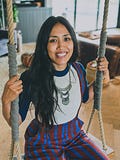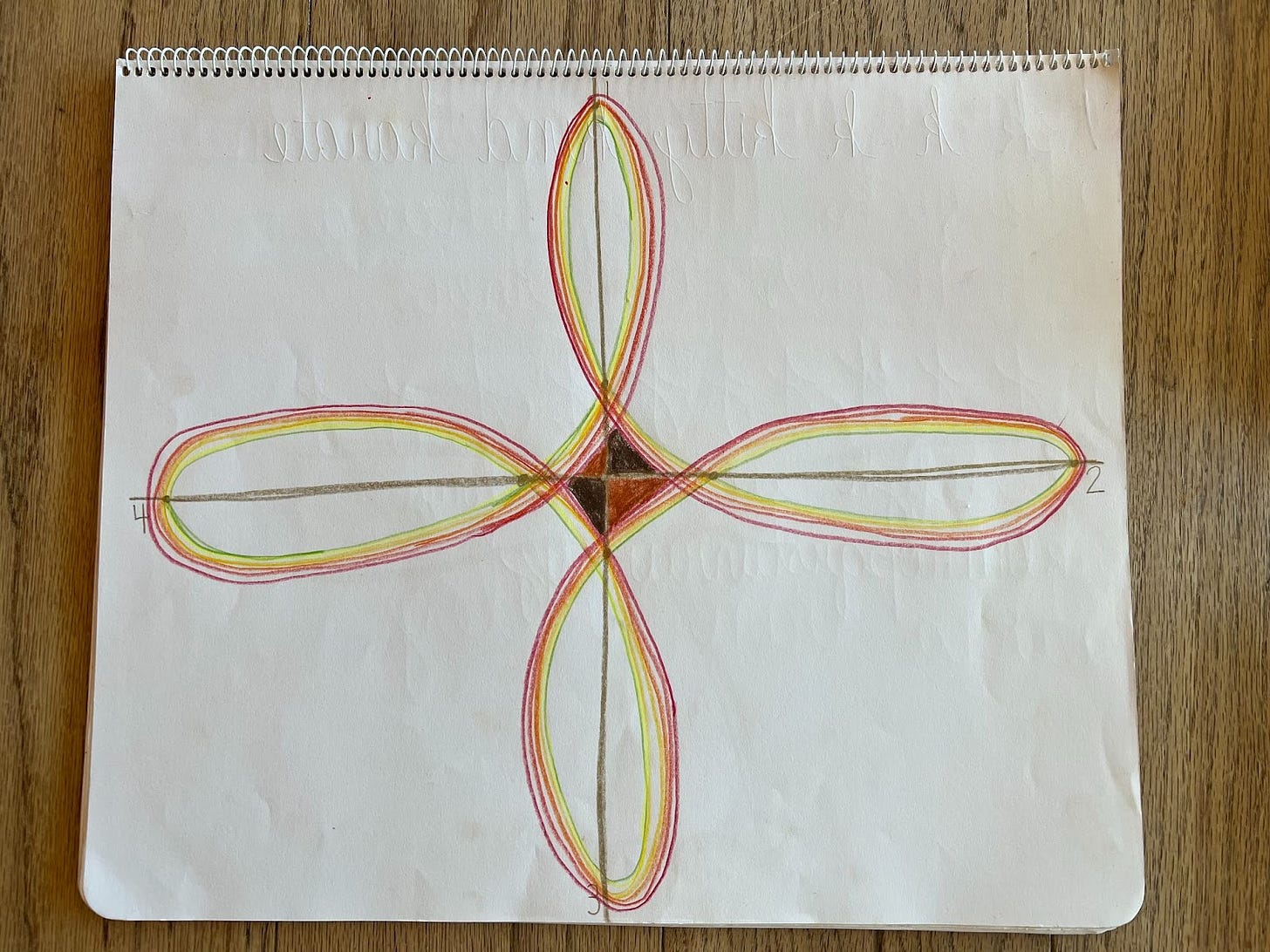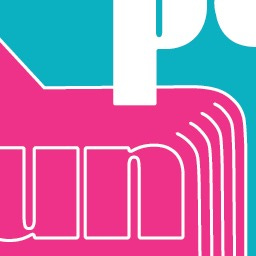"caring for yourself as a caregiver is a necessary and hard job in today’s world"
writer and podcaster Stephanie Jucar Cooley on Waldorf education and slow living, acknowledging the support we have in caregiving, and getting comfortable in audio and video
Hello there! This is the third entry in a new section, good creatures, that will explore the intersection of caregiving and creative practice. I’m so excited to showcase people doing lots of kinds of caregiving—people caring for kids or pets or other family members and/or caring for space through gardening or community work or activism—and lots of kinds of creative work.
If you know (or are!) a good creature whose work we should feature, send me an email—you can just reply to this newsletter.
Today’s interview is with
, who writes the newsletter unpacking, where she’s recently explored questions like Does hypnosis work?, Did I marry a man like my father?, and Can you enter a K-hole to exit depression?. She also hosts the podcast Real Mother F*ckers, which covers the many sides of motherhood, ranging from Vacation with kids to Lola L’Amour + sex, part 2 to Diana Bamford + maternal mental health, perinatal mood and anxiety disorders (PMADs). Stephanie started her career in journalism, then moved into Tech PR. When Stephanie wrote to me about the wide variety of caregiving she does—she has a 9-year-old daughter, 5-year-old son, 18-year-old nephew, 2 dogs, 2 cats, 10 chickens, and a lot of houseplants (!!!)—I knew we had to feature her so I could learn more.Below, Stephanie and I talk about slow living, the importance of shitty first drafts in writing and roller skating, and her confidence, in watching Gen Z, that “the future is not fucked.”
Who do you care for?
I care for my daughter, 9, and son, (almost) 6. Three years ago, we took in my nephew, who is now 18 and leaves for university at the end of September. I also care for our white german shepherd, chocolate labrador, two cats, and 9 chickens on almost 3 acres of property. All of this cannot be done without the work of two other main caregivers, my husband, who is an active father and contributor in our home, and our nanny, who has been with us for 2.5 years.
Because of these two, plus the help of my nephew, community of other friends, family and moms, I cannot run this precious operation on my own. Well, I probably could, but I’d be a terribly functioning human and any time for myself and my creative pursuits would be out the window.
When we see awesome mothers from high positions, I wish they talked more about the help they receive, they pay for, they employ, and the schools and communities that help them raise their families. It’s odd and uncomfortable to show privilege but I believe it’s a part of the caregiving story that needs to be more widely shared. In response, a lot of moms who have limited or no help end up feeling inadequate and question why they can’t seem to handle it all.
Lastly, I care for myself. It’s important to acknowledge that caring for yourself as a caregiver is a necessary and hard job in today’s world. My habits ebb and flow but I’ve been on a good run of exercise (walking daily, yoga, pilates), sleep, reading, writing to nourish my soul, and establish positive relationships. If I don’t care for myself, I wouldn’t be able to care for my family.
What kind of creative work do you do?
I started creative work about a year ago. At first, I started my substack while I was running my own tech PR consultancy. It was a way for me to creatively write because I felt stuck as a ghost writer, often churning business-centered articles on behalf of businessmen. My substack, called Unpacking, is a Friday newsletter covering anything going on in my life that I think can resonate with others. I “unpack” the human experience, focusing on midlife, motherhood, mental health, and a more mindful way to live our daily lives.
As someone in PR, I relished in the safety of never having to be in front of the camera or recording equipment so it’s a surprise to me that I started a video podcast. For my friend’s birthday, she invited me to come with her to see a medium. During our session, a family member came to “visit” my friend and told her that it’s time to pursue the thing that’s been on her mind. During lunch that day, my friend revealed that she wanted to start a podcast about motherhood but hadn’t found the right co-host to match her personality and energy. When she said I was the one, to be honest, I was scared to say yes.
I don’t think I explained it well earlier. Being in front of a camera or recording device made me cringe and want to crawl in a hole forever. Maybe I’m being dramatic? It doesn’t matter now because it was meant to be. She caught me at a good time. I said yes to more creativity and risk.
Three months later, we’ve been posting episodes weekly as the Real Mother Fuckers. We discuss authentic and honest personal stories and interview guests about the many realities of motherhood – and life. We talk about sex after babies, the identity crisis moms experience, postpartum health, boundaries, friendships and more.
What are some ways care-giving fosters creativity and vice versa?
My children go to a Waldorf school, which has inspired me to live more slowly. It’s a method of teaching centered around nature, imagination and creative play. They encourage no-media or low-media consumption at home and my kids use paper, pencil, slate and chalk in class. Preschool and kindergarten focus more on social skills and learn their place in the world and home by participating in household work and building gardens. My kids work with their hands, actively creating art and music. If you’re wondering, yes, they still learn to read, write, do math, science, learn history. Instead of typing on a computer, they move their fingers through knitting, watercolor techniques, write in cursive, and practice form drawing.
I wrote about slow living and this education curriculum on my substack, called Slow and low, that is the tempo (an ode to the Beastie Boys song!) Living slowly can mean a lot of things to different people and my interpretation is to be more mindful and intentional of what I do. I first learned the importance of this when I was practicing more slow activities with my children. I put away the screen and read with them more, cook meals together, help them find purpose and their place in this world by teaching them to take care of our home and animals.
All of these activities do not seem like “creative” pursuits. Yet, they have everything to do with it. To make art, to write, to make something meaningful, the creator has to live life.
I’ve read a couple of Julia Cameron’s books, The Artist’s Way and Write for Life. Both talk about how the best artist you can be is to go out and be a human in this world. How can I have any stories to share on my podcast, or relate to any moms I interview, if I don’t experience being a mother and all that is good, bad and everything hard and pleasant between? If I don’t experience the ebbs and flow of life, how the heck am I going to write about what I felt, saw, smelled, tasted? To write, we have to live.
Is there someone who inspires you that both fosters a creative practice and is a care-giver?
I’m fascinated by the generation younger than me – Gen Z. Two people come to mind when answering this question – my nanny (26) and my nephew (18). As a geriatric millennial mother, I find myself constantly scratching my head at the younger generations’ mindset, their view of trust and relationships, how they grew up with a phone or screen in their hands from day one, etc. I think we are quick to say, “kids these days” and throw our hands at how the future is in danger but I’d love for us to think beyond this mindset.
Creatively, my vegan nanny is a home cook whiz. She can find two odd ingredients that need to be used up in my fridge and whip up a meal for my family inspired by the unlikely pair of pantry items. My nephew is a music head and thrifted fashion lover. I appreciate our similar affinity toward style and enjoy his shared spotify playlist filled with music I’ve never heard before. I’m not surprised I like a lot of the music even though I initially find it odd but it grows on me. Is this proof I’m not “old” yet?!
I’ve witnessed both of these young humans care for my kids over the past several years. Based on their caregiving, I can confidently tell you, the future is not fucked. They both came from very difficult homes, with very complicated upbringings. Yet, they uphold the value system we’ve created for our kids by teaching them to be kind, to be responsible, to be playful. They paint together, they clean up together, they build tree houses and forts together. Together, they create safety and trust. These are simple parts of being human and I’m glad to see these are being passed down to generations younger than me.
What’s your creative philosophy and how has it expanded with the addition of caregiving?
Write shitty first drafts.
I first heard of Anne Lamott’s classic book about writing, called Bird By Bird, in Chanel Miller’s book, Know My Name. Miller’s book is a harrowing yet beautiful story about survival. She also talks a lot about the writing process and mentioned Lamott’s book.
Lamott said of writing shitty first drafts: “All good writers write them. This is how they end up with good second drafts and terrific third drafts.”
This advice can be applied to my life, not just writing! As a writer, I’ve found myself paralyzed by writing the first words down because I want it to be good from the start. There have been so many times I never started something because I knew the first and several few tries would suck. During the height of the pandemic, I tried roller skating with my daughter but I was so afraid to fall and I never got good at it. We tried again a couple weeks ago and I told myself that falling is inevitable. Guess what? I roller skate with my kids now. I’ve fallen a few times and I’m glad I got those shitty first skates in because now I’m invigorated to try more complex and fun moves. Bonus, I get to do a fun hobby with my kids!
What’s changed about your process? About your medium or genre?
Since writing my newsletter, I’ve gotten more comfortable with audio and video. I’m not a technical person (yet) but I’m slowly learning and I think the most important step in this process is being comfortable with the content you create in these mediums.
Before, speaking in front of a camera made me feel sick but now, it gives me a tiny stomach ache. Ha, it’s still a process, folks! I enjoy writing but I am also a good conversationalist and verbal storyteller. I value friendships and connections I make with people in real life and I’m experimenting with trying to infuse a bit of that in my writing by posting complementary videos on each newsletter topic. The hard reality for a writer is knowing that many people don’t want to read and I’d still love to find a way to connect with people who want to hear a good story. If someone doesn’t want to read at that moment, maybe they will get a similar effect by hearing me tell a story. What about if they can see my face or get a visual glimpse of my story? I aim to offer many ways to consume a story.
Write More, Be Less Careful is a newsletter about why writing is hard & how to do it anyway. You can find my books here and read other recent writing here. If you’d like occasional dog photos, glimpses of my walks around town, and writing process snapshots, find me on instagram.
If Write More has helped you in your creative life, I’d love it if you would share it with a friend.








Nancy, I am so honored you gave me space to talk about caregiving and creativity. Your questions sparked a lot of new thoughts for me, helped me dig more deeply into how caregiving fosters my creative pursuits. Caregiving in my life is such a special experience. I am a caregiver and surrounded by other caregivers, who help build this amazing tribe I'm proud to be apart of. With this help, I can share my stories, other mother's stories, and live a creative life. Thank you for this opportunity!